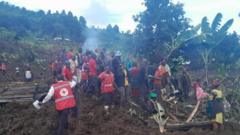Officials in Uganda are grappling with the aftermath of a catastrophic landslide that has swept through eastern regions, leaving destruction and sorrow in its wake. Following a period of intense rainfall that inundated the area, the landslide occurred in Bulambuli district, approximately 280 km from the nation's capital, Kampala. The Ugandan Red Cross Society has reported at least 13 confirmed fatalities, with other sources predicting that this toll could rise to as high as 30, particularly highlighting the tragic loss of children among the deceased, as noted by the Daily Monitor.
In light of the calamity, Prime Minister Robinah Nabbanja took to social media platform X to issue a disaster warning, expressing concerns about missing individuals and the potential for additional victims trapped beneath mountain debris. The severe weather has also led to swollen rivers, overflowing their banks, and causing widespread flooding that has decimated local infrastructure, including schools, roads, and bridges, rendering various communities isolated and in dire need of assistance.
In response to this disaster, local military forces have stepped in to support search and recovery operations, with reports indicating that boats have been utilized in rescue missions. Unfortunately, during one such operation, a boat capsized, leading to the death of an engineer. Expressing solidarity with affected families, Speaker of Parliament Anitah Among offered condolences during a parliamentary session, articulating the collective grief for the lives lost during this tumultuous period in Uganda.
The ongoing situation in Uganda serves as a poignant reminder of the increasing frequency of extreme weather events linked to climate change, raising concerns about preparedness and resilience in vulnerable communities across the region. As rescue efforts continue, the priority remains on locating survivors and addressing the immediate needs of displaced individuals. The government, alongside humanitarian organizations, is being called to take measures to bolster disaster preparedness and response to mitigate the impacts of such natural disasters in the future.



















